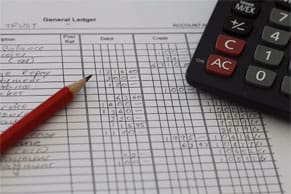Risk management, compliance, efficiency and growth: These are just a few mission-critical goals for most any company — and internal auditors are charged with their oversight. Internal auditors combine specialized auditing skills with their knowledge of company policies and procedures and industry rules to analyze how well a company is doing, identify ways to limit risk and increase operational efficiency, and verify compliance with all necessary laws and regulations. Internal auditors work in many different sectors and can perform audits for virtually any company department.
This article explains internal auditors’ role in an organization, the skills and education they require, the step-by-process by which they conduct internal audits and the benefits they bring to the table.
What Is an Internal Auditor (IA)?
The primary job of an internal auditor, or IA, is to evaluate a company’s compliance with laws, regulations and internal policies in order to identify and investigate potential risks or fraud. In this regard, they may examine everything from the company’s accounting books to its adherence to data privacy regulation. As a close second, internal auditors are also tasked with finding areas for improvement, such as a business process that could be made more efficient. Internal auditors are employees of the companies they examine.
Internal Auditor vs. External Auditor
The main difference between an internal and external auditor is their employer. Internal auditors are employed by the company being audited, so their purpose is to safeguard the company from risk and find ways to improve its operations. They work with colleagues and management to determine and share ways the company can enhance its internal controls, risk management, compliance and operational efficiency. External auditors operate independently of the company being audited and are mainly focused on providing an independent, objective opinion about the accuracy and fairness of the company’s financial statements. External auditors customarily produce reports for outside stakeholders or government agencies.
Key Takeaways
- Internal auditors look for ways to improve a company’s efficiency, controls and risk management.
- Conducting an internal audit is a structured, multistep process that includes making an audit plan, gathering evidence, analyzing the data and reporting it to management.
- The cost of employing internal auditors is often outweighed by the savings they generate.
Internal Auditors Explained
Internal auditors play a vital role in providing objective and impartial analysis of a company’s financial reporting, operations, compliance and risk management. Their work is meant to inform management about where things are running smoothly and where they aren’t. That could include internal controls, operational workflow, IT or accounting, to name a few.
Some of the questions internal auditors seek to answer include:
- How effective are the controls that the company has put in place?
- How much risk is the company exposed to? Which risks are the most dangerous, and how can they be mitigated?
- How efficient are the company’s business process workflows? Are there opportunities for improvement?
- Are there signs of theft or fraud in company records?
Internal auditors answer these questions by conducting fieldwork — for example, studying company records and interviewing key stakeholders — and analyzing their findings. Then they present their recommendations to senior management and key stakeholders.
What Does an Internal Auditor Do?
Internal auditors act as watchdogs to make certain that a company’s operations are on the right track and aligned with company strategy, as well as to ensure that its financial statements are accurate and reported correctly. They also help protect against theft and fraud in the company.
Risk assessment: Internal auditors work to identify and evaluate potential risks and vulnerabilities. Those risks could be strategic, financial, operational or compliance-oriented. Internal auditors also determine whether the company’s controls are sufficient to mitigate the identified risks and, if not, help the organization develop and implement appropriate risk mitigation strategies.
Control environment evaluation: Internal auditors assess the effectiveness of internal controls put in place to guard the integrity of financial and accounting information. In regulated industries, such as financial services and healthcare, they also assess the efficacy of controls meant to ensure that business operations comply with industry regulations. This helps to determine whether any existing controls need to be modified or new ones implemented to protect company assets. Internal auditors also check to see whether those controls are actually implemented as designed.
Compliance: Internal auditors ensure that the company adheres to all of the applicable laws and regulations in places where they do business, such as the Generally Accepted Accounting Principles (GAAP) in the U.S., industry regulations and company policies. This reduces the risk of fines, penalties and/or reputational damage.
Operational efficiency: Studying workflows and how resources are distributed can help internal auditors discover impediments to business efficiency. That includes redundancies, waste and bottlenecks, to name a few.
Financial reporting: Internal auditors verify the accuracy and reliability of the organization’s financial information, including transactions, records and reporting. Financial data communicated to internal stakeholders includes the company’s quarterly and year-end income statement, balance sheet and statement of cash flows. Review of these documents is a crucial function of internal auditors. They also frequently check a company’s accounting in advance of an external audit.
Consultation and advisory: Internal auditors provide advice, guidance and recommendations to management about risk management, internal controls and process improvements. They work with all departments related to the scope of the audit and maintain open lines of communications with management and members of the audit committee, if applicable.
Reporting: Once the research for an audit is completed, internal auditors document their findings, conclusions and recommendations in comprehensive audit reports. These reports are presented to management to facilitate informed decision-making and drive necessary changes within the organization.
Continuous education and improvement: Laws, regulations and GAAP are always evolving, as are industry-specific rules. Internal auditors must keep up with all of them through continuing education courses, seminars and webinars if they are to stay sharp. By pursuing continuous professional education — which is sometimes a requirement for maintaining certain certifications or qualifications — auditors can provide more valuable insights and recommendations to the company.

Understanding the Internal Auditing Process
The process of conducting an internal audit involves a series of steps designed to analyze risk and operations and to identify areas in need of improvement. To do this well, an internal auditor must follow a structured process, starting with the development of an audit plan. By systematically executing each of the seven internal audit steps outlined below, auditors can provide valuable assurance, insights and guidance to senior managers.
Planning Phase
Developing an audit plan establishes the objectives, methodology, requirements and schedule of the audit, as well as the responsibilities of each person on the audit team. A review of previous audits can provide a sense of management’s expectations, history and context. The plan should include a detailed timeline.
Preliminary Survey
The purpose of this step is to gain a deeper understanding of the area or process being audited before audit fieldwork begins. Activities in this step include reviewing relevant documentation, interviewing key personnel, observing operations to understand how the process functions in practice and itemizing the possible risks, control weaknesses and improvement ideas the audit will look for.
Fieldwork
This is where the auditors do their research and gather the findings they will analyze later. They’ll review documents, interview staff directly involved with the tasks, run tests and observe processes as they’re taking place. This step also includes testing the design and operating effectiveness of internal controls, sampling transactions in the data to verify compliance with regulations and/or company policies, and documenting the evidence they discover.
Analysis
At this point, auditors compare the gathered evidence against policies, standards and procedures. Are best practices being adhered to? Are there areas of weakness, discrepancies or noncompliance? The analysis should answer these questions and figure out where and why any adverse findings occurred. It’s common for the scope of an audit to change direction as the data collected during fieldwork is analyzed. During this step, internal auditors look for the root causes of any issues or control weaknesses they find; determine the potential impact of their findings on the organization’s operations, compliance and risk exposure; and draw conclusions and develop recommendations.
Reporting
In this step, internal auditors write up their audit findings and recommendations, communicate them to management and propose corrective action. An internal audit report frequently adheres to what’s known as the “five Cs”: criteria, condition, cause, consequence and corrective action. The audit report should outline the scope of the audit, how it was conducted, important discoveries and ways to improve.
Follow-Up
A thorough internal auditing process includes following up on the initial report after a certain period of time. Was a plan put in place to take corrective actions? What were the results? This step usually concludes with a report to management on the effectiveness of corrective actions. This is unique to internal auditors, since external auditors aren’t required to follow up beyond the date of their audit report.
Communication and Consultation
During and after the internal audit, open lines of communication should be maintained with the stakeholders in the process. That includes management and the employees connected to the department being audited. It helps to support continuous improvement in efficiency and risk management for the company.
Requirements for Internal Auditors
As with most jobs in the business sector, there’s a clear path to becoming an internal auditor. It includes both tangible achievements and intangible characteristics.
Skills
First up are the obvious ones: a strong working knowledge of accounting and auditing processes — including sampling and statistics, which demand a high proficiency in math — and a keen understanding of GAAP. Attention to detail is another tremendous asset. Internal auditors also must possess good judgment, integrity and effective communication skills. Know-how about numbers may be the main ingredient, but they’re meaningless if the auditor doesn’t have the ability to translate what they mean to management.
Education
Generally speaking, the minimum educational requirement to become an internal auditor is a bachelor’s degree in accounting, finance or business. A master’s degree or possession of a professional certificate (see next section) can put a resume to the top of the pile. Still, an associate degree, combined with the right amount of experience in the field, can be sufficient for some businesses.
Certifications
Professional certifications aren’t required to become an internal auditor, though having one or more certainly helps candidates in the job application process. The Certified Internal Auditor (CIA) certification, awarded by the Institute of Internal Auditors, is looked at as the standard bearer of competency for an internal auditor. Specialized certifications that focus on specific types of businesses, such as information systems or medical claims, are also available. Once certified, an auditor can expect to take continuing education classes to remain on top of the latest best practices and regulations in their field.
Experience
Companies will typically want to see accounting or auditing experience on an internal auditor’s resume. Experience can be obtained through internships while in college or in entry-level jobs. The number of years of field experience needed to advance depends on the business and position.
Benefits of Having an Internal Auditor
The work of internal auditors often creates cost savings that more than offset their cost to the company. It also can reduce the work of an external auditor, which, in turn, saves more money. Additional benefits of employing an internal auditors are:
Improved risk management: An internal auditor’s main job is to systematically identify, assess and evaluate the organization’s exposure to various risks and recommend how to protect against them through improved controls and processes.
Enhanced internal controls: Customarily, the mere existence of an internal auditing department bodes well for a company’s overall control environment. The audit process will determine whether the controls in place are effective enough to maintain efficiency and compliance. Employees are also more likely to adhere to policies when they know that their work product may be analyzed and reported to management.
Increased operational efficiency: Businesses are always looking to improve their processes, optimize resources and reduce expenses in order to operate more efficiently. As in-house staff, internal auditors have extensive knowledge of the company’s inner workings and its industry. In some ways, they can be viewed as internal consultants.
Assurance of compliance: Keeping the company in compliance with the relevant laws, regulations and industry standards reduces the risk of reputational damage or penalties if noncompliance were discovered by independent auditors or other agencies.
Objective insight and independent assurance: Yes, an internal auditor is employed by the company it is auditing. But when it comes to internal audits, senior management is looking for objective and impartial analysis and reporting of findings.
Fraud detection and prevention: Examining the company’s financial documents could uncover acts of fraud or theft. Identifying fraudulent activity internally reduces the risk of discovery by an external auditor. Public fraud can lead to large legal and financial issues, as well as damage the company’s reputation with current and future clients.
Enhanced governance: When investors are assessing a business, they look to see how a company conducts (and cooperates with) its audits, both internal and external. Frequent and thorough internal audits enhance outsiders’ views of company governance — the rules by which a company is directed and controlled.
Keep Your Records in One Place for Easier Auditing
High-quality internal audits that yield actionable results are only possible when a company has accurate, reliable and up-to-date data on the accounting and/or operational areas being audited. NetSuite Cloud Accounting Software provides a comprehensive suite of tools that streamline and enhance the internal auditing process. NetSuite’s financial reporting capabilities allow internal auditors to easily access and analyze financial data. Moreover, strong internal controls and audit trails ensure data accuracy while helping to maintain compliance with various laws, regulations and industry standards. The solution’s real-time data processing and consolidated financial reporting features enable auditors to quickly identify potential discrepancies or areas of concern and facilitate more efficient risk assessment and evaluation of existing controls.
In addition, NetSuite’s role-based access controls and segregation of duties make sure that only authorized personnel can access sensitive financial information, reducing the risk of fraud and errors. NetSuite’s automated workflows and approval processes further strengthen internal controls, making it simpler for auditors to assess their effectiveness and identify any weaknesses.
Internal auditors play a crucial role in safeguarding an organization’s financial integrity, ensuring compliance and improving operational efficiency. They can provide valuable insights and recommendations that drive positive change in companies of any size and in any industry. Internal auditors offer an objective and impartial look at business operations, find inefficiencies or errors and suggest ways for management to correct them.
Internal Auditor FAQs
Is internal audit a hard or stressful job?
The job of an internal auditor is to comb through numbers and spreadsheets, manage risk and people, and ensure that company activities adhere to all relevant laws and regulations. That can make for some high-pressure situations. Throw in tight deadlines and the occasions when an auditor’s colleagues do not entirely welcome presence, and yes, it can be stressful. But stress, in one form or another, comes with most any job. Internal auditing jobs can pay well and are in high demand.
Who qualifies to be an internal auditor?
Generally, an internal auditor must hold at least a bachelor’s degree in accounting or finance, though other degrees, such as economics or business, are possible. Additional certifications may be required by some businesses.
Do internal auditors need to have a CPA?
While some internal auditors may be certified public accountants (CPAs), it is not a requirement to become an internal auditor. A bachelor’s degree is required for a CPA, as is continuing education.
What are the 3 types of internal audits?
Internal audits traditionally focus on accounting and finance. But there are other types as well. Three notable types are compliance audits, operation audits and IT audits.
A compliance audit evaluates where the company stands in adhering to its goals and objectives, as well as to regulations, laws, contracts and other performance-based areas.
An operational audit studies how well internal controls are working and how efficient operating procedures are running.
An IT audit aims to determine how well the technology used by the business is performing. Is the infrastructure efficient enough? Are operating systems working correctly? Is data stored safely and securely?









